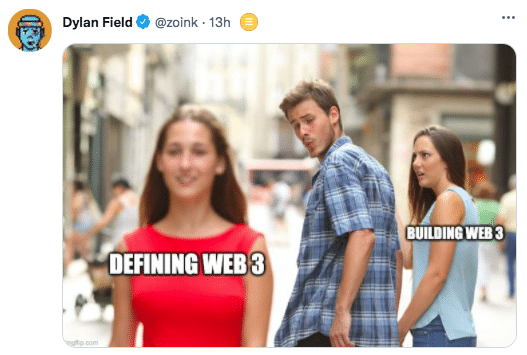January 10, 2022 / Unchained Daily / Laura Shin
Daily Bits ✍️✍️✍️
-
PayPal confirms that it is exploring a stablecoin backed by US dollars.
-
a16z released ten new principles for crypto regulation.
-
Katie Haun is looking to raise $900 million for a pair of investment funds.
-
Serum’s community foundation brought in $75 million in a token sale.
-
Pudgy Penguins NFT holders voted to kick out the founders and are considering ways to decentralize.
-
A new ERC standard proposal wants to make yield-bearing tokens easier to integrate into DeFi protocols.
-
Coinbase insiders sold $40 million in stock during December.
-
The US Department of Transportation could soon start research on crypto-token incentives.
-
Transactions on Fantom passed Avalanche last week.
-
Mozilla paused its acceptance of crypto donations after online backlash last week.
- Binance.US is building an office in the metaverse.
What Do You Meme?
What’s Poppin’?
Lots of Downtime
It has been a tough start to the year for high-throughput, low-latency blockchains.
Arbitrum, the largest Ethereum layer 2 solution by total value locked, only produced 17 blocks between 5:34:13 am ET and 3:27:50 pm on Sunday, hinting that the network could be down. At 8:13 am ET Sunday, the team confirmed the network was having issues: “We are currently experiencing Sequencer downtime. Thank you for your patience as we work to restore it. All funds in the system are safe, and we will post updates here.”
A few hours later, the network was back up and running. “The Sequencer is back online. Thank you very much for patiently bearing with us as we resolved the issue. More details about what occurred to follow,” explained the team on Twitter. (For context, during the last minute of writing this blog post, Arbitrum produced 20+ blocks according to its block explorer.)
Offchain Labs documentation says that a sequencer is a node with complete control over ordering transactions on Arbitrum without relying on Ethereum. A sequencer allows for transactions on the chain to be finalized more quickly (as a centralized sequencer does not have to backdate transactions for as many transactions as a chain without a sequencer).
For now, Offchain Labs, the developer of Arbitrum, runs the only sequencer on the network. The docs describe this decision as “useful but not decentralized.” In the long term, Offchain wants to decentralize the Arbitrum sequencer through a committee of servers – though this process is “complicated.” Based on a December 9th blog post, it appears that Offchain is working with Chainlink Labs to decentralize the Artbitrum sequencer.
This is the second time Arbitrum has gone down due to a sequencer issue.
In addition to Arbitrum, Solana and Polygon also had issues with networks. However, as Arbitrum was down due to the sequencer, both Solana and Polygon appear to be struggling to keep up with an ever-increasing number of transactions on their respective networks.
On Saturday, Solana Status admitted that Solana was experiencing difficulties. “The Solana Network is currently experiencing degraded performance due to an increase in high compute transactions, which is reducing network capacity to several thousand transactions per second. This is leading to some failed transactions for users,” explained the team.
A thread from Tomas Eminger, head of validator infrastructure at Rockaway Blockchain Fund, which was retweeted by Solana founder Anatoly Yakovenko, stated that the Solana engineering team released a new version of its software, solving a crucial bug slowing down block and transaction times. Eminger said that the upgrade is now deployed by 15% of the Solana validators.
Polygon has also faced issues due to Sunflower Farmers, a blockchain game congesting the network. The game, which works like a simple farming app you might find on Facebook, is clogging up Polygon and gas fees have skyrocketed in the new year. Last Wednesday, for example, the average gas fee on Polygon was 763 gwei, which is about 6x the average gas fee from January 1 2022. Data from DappRadar shows that Sunflower Farmer is the third most popular dapp in crypto over the past seven days, with approximately 469K addresses interacting with the game.
Recommended Reads
- Moxie Marlinspike, founder of Signal, on web3: https://moxie.org/2022/01/07/web3-first-impressions.html
- Arthur Hayes on why he thinks the bear market is upon us: https://cryptohayes.medium.com/maelstrom-ee6021e9d0c2
- Casa’s Jameson Lopp on Bitcoin in 2021: https://blog.lopp.net/bitcoin-2021-annual-review/
On The Pod…
65% of Active Developers Joined Web3 in 2021(Bonus Content: You can read a summary of my conversation w/ Maria on Medium here.)
Electric Capital’s Maria Shen dives into her company’s recently published research report about Web3 open-source development in 2021 and shares her thoughts and insights on how developers are flocking to Web3 in a manner that goes far beyond just Bitcoin and Ethereum. Show topics:
-
Maria’s biggest takeaways from the Electric Capital Developer Report
-
how developer growth is affected by asset price
-
which ecosystems are growing fastest
-
why Maria thinks the growth in Bitcoin development has slowed down
-
why Maria is so impressed by Ethereum’s performance in terms of retaining developers
-
how closed-source development on, for example, Solana or Flow could affect the report’s findings
-
the significance of Polkadot, Solana, NEAR, Binance Smart Chain, Avalanche, and Terra growing faster than Ethereum did at similar points in its history
-
developer growth in DeFi during 2021
-
why Electric Capital did not study developer growth for NFTs, DAOs, or gaming
-
why Maria is so interested in studying community growth going forward
Book Update
My book, The Cryptopians: Idealism, Greed, Lies, and the Making of the First Big Cryptocurrency Craze, is now available for pre-order now.
The book, which is all about Ethereum and the 2017 ICO mania, comes out Feb. 22. Pre-order it today!
You can purchase it here: http://bit.ly/cryptopians




